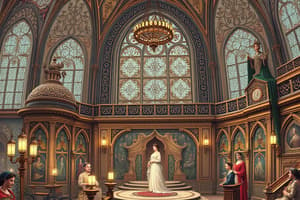Podcast
Questions and Answers
What characterizes the Prehistoric Period?
What characterizes the Prehistoric Period?
- Development of written language
- Feudal systems and religious institutions
- Human development before the invention of writing (correct)
- Rise of early civilizations
Which major event is associated with the Medieval Period in Europe?
Which major event is associated with the Medieval Period in Europe?
- The Industrial Revolution
- The Scientific Revolution
- The Crusades (correct)
- The Renaissance
What significant developments occurred during Ancient History?
What significant developments occurred during Ancient History?
- Rise and fall of early civilizations (correct)
- Globalization and technology
- Colonial independence movements
- Nationalism and early capitalism
How do primary sources contribute to historical study?
How do primary sources contribute to historical study?
During which historical period did the Scientific Revolution occur?
During which historical period did the Scientific Revolution occur?
What is an aspect of historiography?
What is an aspect of historiography?
Which period is defined by the impact of the World Wars and the Cold War?
Which period is defined by the impact of the World Wars and the Cold War?
What factor can lead to bias in historical accounts?
What factor can lead to bias in historical accounts?
Flashcards
Prehistoric Period
Prehistoric Period
The time period before the invention of writing, studied through archaeological finds and anthropological studies.
Ancient History
Ancient History
This era encompasses the rise and fall of early civilizations like Mesopotamia, Egypt, Greece, and Rome, marked by significant developments in writing, law, philosophy, and architecture.
Medieval Period
Medieval Period
This period in Europe was characterized by the rise of feudalism, the Crusades, the Black Death, and a strong influence of religion.
Early Modern Period
Early Modern Period
Signup and view all the flashcards
Modern Period
Modern Period
Signup and view all the flashcards
Contemporary History
Contemporary History
Signup and view all the flashcards
Primary Sources
Primary Sources
Signup and view all the flashcards
Secondary Sources
Secondary Sources
Signup and view all the flashcards
Study Notes
Historical Periods
- History encompasses the entire timeline of human events, encompassing all aspects of human experience, from earliest civilizations to modern times.
- Historians study a range of subjects, including politics, economics, social life, culture, and technology.
- History offers valuable insights into the complexities of human society, helping us understand the present and anticipate the future.
Key Historical Eras
- Prehistoric Period: This era covers human development before the invention of writing. Evidence comes from archaeological finds and anthropological studies.
- Ancient History: This period includes the rise and fall of early civilizations like Mesopotamia, Egypt, Greece, and Rome. Significant developments in writing, law, philosophy, and architecture occurred.
- Medieval Period: Europe experienced the rise of feudalism, the Crusades, and the Black Death during this time. Religion played a significant role.
- Early Modern Period: European exploration, the Renaissance, the Reformation, and the Scientific Revolution mark this era. Nationalism and early forms of capitalism started to develop.
- Modern Period: The Industrial Revolution, the World Wars, and the Cold War defined this era, transforming global politics, society, and technology.
- Contemporary History: This is the most recent historical period, covering events from the decolonization era to the present day. Issues such as globalization, technological advancement, and social activism are prominent.
Methods of Studying History
- Primary Sources: These are original documents, artifacts, or other materials from the time period being studied. Examples include letters, diaries, photographs, and government records.
- Secondary Sources: These analyze primary sources and offer interpretations of historical events. Books, journal articles, and scholarly essays are included in this category.
- Historical Interpretation: Historians employ various frameworks, including social, political, economic, and cultural perspectives, to analyze and interpret historical events.
- Historiography: This examines the development of historical interpretations and the different ways historians have understood the past over time.
Challenges in Historical Study
- Bias: Historical accounts often reflect the perspectives of those who created them, which might be influenced by factors like gender, social class, or nationality.
- Limited Sources: Some historical events might lack comprehensive documentation or reliable records.
- Interpreting Evidence: Extracting meaning from historical evidence can be complex and requires critical evaluation.
- Preservation of Artifacts: Damage or loss to historical documents and artifacts can limit research opportunities.
Studying That Suits You
Use AI to generate personalized quizzes and flashcards to suit your learning preferences.



